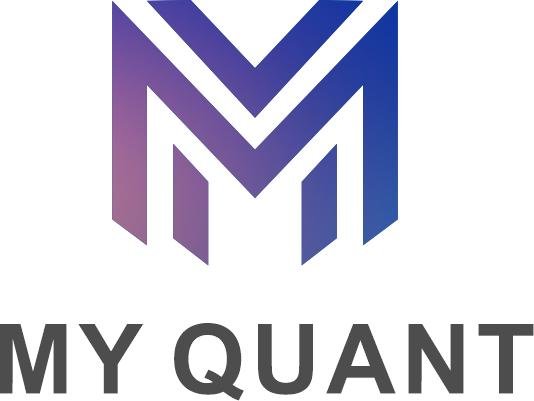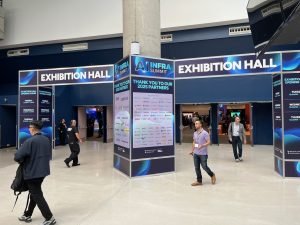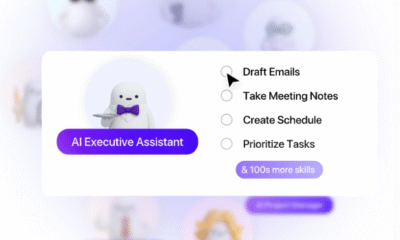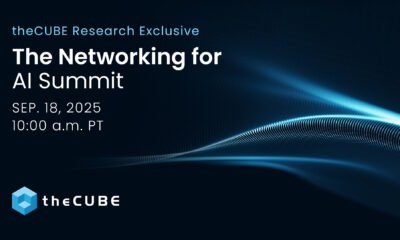Tools & Platforms
Cybersecurity challenges and AWS solutions in the AI era

As the technology world has grown more complicated through an explosion in artificial intelligence use cases, it has also led to challenges for cybersecurity professionals. Generative AI applications must be secured, the infrastructure around AI needs to be protected, and there is a constant worry about new threats driven by AI-powered tools.
AWS’ Rohan Karmarkar talks with theCUBEs John Furrier about cybersecurity.
For major cloud practitioners such as Amazon Web Services Inc., this reality requires close coordination with its partners to ensure that these factors are properly managed.
“We’re definitely seeing an increase in the velocity of attacks, so obviously security partners have to cater to that, AWS has to cater to that,” said Rohan Karmarkar (pictured), director of APO technology for AWS Partner SA. “These partners are making sure that they build capability to defend against AI-powered attacks and also build capability to make the security engineers and security operations center more productive, more automated. Those are the two things that we’re working with our partners on to build those capabilities using the secure foundation that we have.”
Karmarkar spoke with theCUBE’s John Furrier at the AWS Mid-Year Leadership Summit, during an exclusive broadcast on theCUBE, SiliconANGLE Media’s livestreaming studio. They discussed how partners are using AWS tools to mitigate threats and build a more secure environment.
Building cybersecurity on AWS
For partners, a key approach for managing security initiatives in the AI world is to build on the AWS platform. This includes leveraging many of the cloud provider’s intelligence tools, according to Karmarkar.
“PagerDuty, one of our key partners, uses Amazon Q Business, Amazon Bedrock and Amazon SageMaker to improve the incident response automation with AI,” Karmarkar said. “There are other partners like Trellix who has a Trellix-wide security assistant, which is built on Amazon Bedrock and SageMaker. Typically, security engineers get overwhelmed with these incidents, so bringing the right context and helping them analyze and getting them more productive is something that security partners are doing.”
Something else that security partners are doing is building agents. AWS is seeing its partners explore innovation in agentic AI to address a wide range of factors, including cost, accuracy and specialized domain management.
“There are a couple of partners like PantherAI and Securonix who have launched various agents that help in security engineering aspects, security operations,” Karmarkar said. “We are seeing a lot of agentic kinds of workflows and applications being built now. They’re starting with simple agents, but we are also seeing trends where agent-to-agent communication and multi-agent kinds of workflows are there.”
Adoption of AI agents and new ways to leverage autonomous technology for improving security have forced many AWS partners and customers to re-evaluate their applications. App modernization has become a key ingredient in building a secure IT environment.
“There’s a lot of conversation around app modernization,” Karmarkar explained. “We definitely are talking about application modernization because application and data modernization is the foundation to have a strong AI. How do we get apps to use the latest technologies, provide interfaces or databases to be vector enabled? It’s an interesting time to be in tech.”
Here’s the complete video interview, part of SiliconANGLE’s and theCUBE’s coverage of the AWS Mid-Year Leadership Summit:
Photo: SiliconANGLE
Support our open free content by sharing and engaging with our content and community.
Join theCUBE Alumni Trust Network
Where Technology Leaders Connect, Share Intelligence & Create Opportunities
11.4k+
CUBE Alumni Network
C-level and Technical
Domain Experts
Connect with 11,413+ industry leaders from our network of tech and business leaders forming a unique trusted network effect.
SiliconANGLE Media is a recognized leader in digital media innovation serving innovative audiences and brands, bringing together cutting-edge technology, influential content, strategic insights and real-time audience engagement. As the parent company of SiliconANGLE, theCUBE Network, theCUBE Research, CUBE365, theCUBE AI and theCUBE SuperStudios — such as those established in Silicon Valley and the New York Stock Exchange (NYSE) — SiliconANGLE Media operates at the intersection of media, technology, and AI. .
Founded by tech visionaries John Furrier and Dave Vellante, SiliconANGLE Media has built a powerful ecosystem of industry-leading digital media brands, with a reach of 15+ million elite tech professionals. The company’s new, proprietary theCUBE AI Video cloud is breaking ground in audience interaction, leveraging theCUBEai.com neural network to help technology companies make data-driven decisions and stay at the forefront of industry conversations.
Tools & Platforms
Professor LEON & MYQuant AI

— A New Era of AI-Driven Finance
In today’s global AI race, models such as GPT and DeepSeek are constantly pushing the boundaries of technology. Yet in the complex game of financial markets, the true challenge is not merely about computing power and data, but about understanding human nature, market behavior, and the logic of capital.
Professor Leon Lee Cheng Wei (LEON) — Ph.D. in Economics from a prestigious university, former Senior Strategy Advisor at a leading financial institution in Asia, and Co-Founder of the Asia-Pacific FinTech Think Tank — has spent over two decades navigating both academia and practice. Now, he has chosen a different path:
to create an AI that not only “converses” but can also trade, forecast, and accompany investors.
Journey: From Academia to Live Trading
· LEON delved into behavioral finance and asset pricing models, realizing that “markets are not inefficient, but human nature is the ultimate variable.”
· On Wall Street and the Singapore Exchange, he witnessed the rise of algorithmic trading, but also how investors struggled without rational tools.
· Returning to Malaysia, he made a resolution:
“I want to build an AI that truly understands both markets and investors.”
Thus, MYQuant AI was born.
Beyond GPT and DeepSeek
While GPT and DeepSeek represent general-purpose AI, the mission of MYQuant AI is to become a specialized AI in finance.
· It not only interprets macroeconomic and market data, but also captures the behavioral biases unique to Asia-Pacific markets.
· It not only generates text, but can also simulate decision-making and optimize strategies in real-time trading.
· It is not just a tool, but an investor’s companion and coach.
Professor LEON firmly believes:
“The future of financial AI is not about answering questions, but about growing alongside investors.”
The Fusion of Finance and Artificial Intelligence
The roadmap of MYQuant AI is clear:
· Behavioral Finance + Machine Learning: Reconstructing the “noise of human nature” behind market moves.
· Quantitative Models + AI Decision-Making: Transforming complex trading logic into executable strategies.
· Local Markets + Global Vision: Bridging Malaysia and Southeast Asian investment culture with global capital flows.
This is not merely a model — it is a philosophy:
bringing AI into the market as the most reliable partner for investors in uncertain times.
Conclusion
Today, MYQuant AI is no longer just a research project, but Professor LEON’s “second language.”
Beyond GPT and DeepSeek, it represents another possibility — the deep integration of artificial intelligence and financial markets.
Technology is not just cold computation; it can also be warmth, responsibility, and a guide to wealth creation.
MYQuant’s Vision:
Make investing more rational, markets more transparent, and AI truly serve people.
Contact Info:
Name: Mary
Email: Send Email
Organization: xmyquant
Website: http://www.xmyquant.com
Disclaimer:
This press release is for informational purposes only. Information verification has been done to the best of our ability. Still, due to the speculative nature of the blockchain (cryptocurrency, NFT, mining, etc.) sector as a whole, complete accuracy cannot always be guaranteed.
You are advised to conduct your own research and exercise caution. Investments in these fields are inherently risky and should be approached with due diligence.
Release ID: 89169671
In case of identifying any problems, concerns, or inaccuracies in the content shared in this press release, or if a press release needs to be taken down, we urge you to notify us immediately by contacting error@releasecontact.com (it is important to note that this email is the authorized channel for such matters, sending multiple emails to multiple addresses does not necessarily help expedite your request). Our dedicated team will be readily accessible to address your concerns and take swift action within 8 hours to rectify any issues identified or assist with the removal process. We are committed to delivering high-quality content and ensuring accuracy for our valued readers.
Tools & Platforms
Datadog Inc. (DDOG)’s AI Initiatives Accelerating Growth

Datadog, Inc. (NASDAQ:DDOG) is one of the best tech stocks to buy for the long term. At Citi’s 2025 Global TMT Conference on September 3, CFO David Obstler reiterated that the company is experiencing robust growth driven by AI-native companies.
The robust growth stems from the company’s increasing focus on strategic initiatives in artificial intelligence and cybersecurity. Consequently, AI initiatives have contributed to 10% of the company’s underlying growth. The growth has occurred in eight of the ten largest AI tool companies, which have leveraged their solutions.
In addition, the executive reiterated that Datadog is pursuing growth opportunities in international markets, with a focus on India and Brazil. As part of the expansion drive, Datadog is also integrating new technologies to maintain its competitive edge. Part of the strategy entails enhancing Cloud SIEM, service management, and product analytics.
Datadog, Inc. (NASDAQ:DDOG) is a technology company that provides a cloud-based platform for observability and security. It also offers tools for infrastructure monitoring, application performance monitoring (APM), log management, real-user monitoring, and security.
While we acknowledge the potential of DDOG as an investment, we believe certain AI stocks offer greater upside potential and carry less downside risk. If you’re looking for an extremely undervalued AI stock that also stands to benefit significantly from Trump-era tariffs and the onshoring trend, see our free report on the best short-term AI stock.
READ NEXT: 12 Best Consumer Goods Stocks Billionaires Are Quietly Buying and Goldman Sachs Penny Stocks: Top 12 Stock Picks.
Disclosure: None. This article is originally published at Insider Monkey.
Tools & Platforms
Somalia, Saudi Arabia Sign Pact on AI and Space Technology

Somalia and Saudi Arabia signed an agreement in Riyadh to cooperate on regulating artificial intelligence and space technology.
The deal was concluded during the Global Symposium for Regulators (GSR-25) by Mustafa Yasin Sheikh, head of Somalia’s National Communications Authority, and Haitham Al-Ohaly, governor of Saudi Arabia’s Communications, Space and Technology Commission.
Officials said the partnership will promote regulatory cooperation, knowledge sharing, and frameworks for responsible growth in AI and space sectors. The two nations also plan to explore infrastructure sharing and broader digital collaboration.
The GSR-25, co-hosted by the International Telecommunication Union and Saudi Arabia, brought together representatives from more than 190 countries to address global digital challenges.
-

 Business2 weeks ago
Business2 weeks agoThe Guardian view on Trump and the Fed: independence is no substitute for accountability | Editorial
-
Tools & Platforms1 month ago
Building Trust in Military AI Starts with Opening the Black Box – War on the Rocks
-

 Ethics & Policy2 months ago
Ethics & Policy2 months agoSDAIA Supports Saudi Arabia’s Leadership in Shaping Global AI Ethics, Policy, and Research – وكالة الأنباء السعودية
-

 Events & Conferences4 months ago
Events & Conferences4 months agoJourney to 1000 models: Scaling Instagram’s recommendation system
-

 Jobs & Careers2 months ago
Jobs & Careers2 months agoMumbai-based Perplexity Alternative Has 60k+ Users Without Funding
-

 Podcasts & Talks2 months ago
Podcasts & Talks2 months agoHappy 4th of July! 🎆 Made with Veo 3 in Gemini
-

 Education2 months ago
Education2 months agoMacron says UK and France have duty to tackle illegal migration ‘with humanity, solidarity and firmness’ – UK politics live | Politics
-

 Education2 months ago
Education2 months agoVEX Robotics launches AI-powered classroom robotics system
-

 Podcasts & Talks2 months ago
Podcasts & Talks2 months agoOpenAI 🤝 @teamganassi
-

 Funding & Business2 months ago
Funding & Business2 months agoKayak and Expedia race to build AI travel agents that turn social posts into itineraries





















